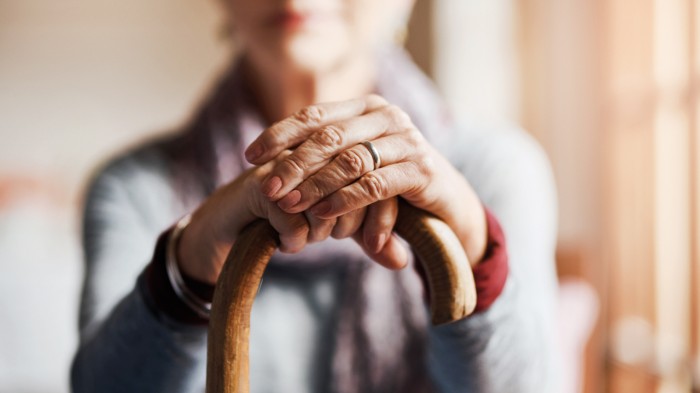In Clinical
Let’s get clinical. Follow the links below to find out more about the latest clinical insight in community pharmacy.Bookmark
In this year’s 'Levelling Up Health' report, the Government set out ambitious aims to deliver five extra healthy years of life for people by 2035, while simultaneously reducing health inequalities2
These actions to improve health were spurred by the worrying statistic that men and women in the UK are currently living with 25-plus years of chronic illness during the latter stages of their lifetime.3 People in the UK of all ages also have the worst population health in the whole of Europe, which exerts a significant drag on economic growth and increases risk from future pandemics.2
Learning objectives
After reading this learning update you should be able to:
- Recognise the importance of preventative healthcare in maximising health outcomes in older age
- Understand the problem of loneliness in older customers and how pharmacy can help address this
- Help older customers navigate key changes in the wake of the Covid-19 pandemic, notably the shift to online healthcare.
Key facts
- Around 12 million people currently living in the UK are aged 65 years or above1
- The Government has set out strategic goals to deliver an extra five healthy years of life for the population by 2035
- Community pharmacy has a key role to play in improving care for elderly patients through direct support and advice and effective signposting to local services
Prevention is key
A key tool in the drive to improve health in old age must clearly involve a focus on prevention in the younger years of life.
According to Professor Chris Whitty, chief medical officer: "If we shifted four behaviours – smoking, unhealthy diet, harmful consumption of alcohol and insufficient physical activity – we could prevent up to 75 per cent of new cases of heart disease, stroke and type 2 diabetes, and 40 per cent of cancer incidence".2
The Government’s report also acknowledges that longevity has changed the policy context – the priority now is not just living longer but living healthier. Most of the population will live 10 years longer than a generation ago, but unfortunately this involves living in ill health, notes the report.
Yet living longer in good health is fundamental for the wellbeing of individuals, for communities, for growth, and to sustain the NHS and social care, the report says.2 To seize the economic and social advantages of longevity requires us to level up our health, it continues. "Health is our most valuable personal asset. If we don’t age well, it hampers our wellbeing and ability to work and contribute."
To achieve the aims of a longer, healthy life, the Government’s focus is on five key areas: smoking, obesity, clean food, clean air and healthy children. Pharmacies have a clear remit for proactive intervention, notably in smoking cessation, weight loss support and dietary/nutritional advice.
Although smoking is most commonly associated with younger age groups, the latest data from the Office for National Statistics shows that 13.9 per cent of people aged 55-64 years old are current smokers, in addition to almost one in 10 (7.8 per cent) of those aged over 65 years.4
For older customers who do continue to smoke, pharmacy can act as a valuable source of advice and encouragement to quit, recommendations on available smoking cessation products and signposting to additional sources of support.
Another important avenue for prevention is healthy eating, which goes hand in hand with weight reduction and avoiding the adverse health outcomes associated with overweight/obesity.
Eating well means someone is more likely to feel healthier, stay active for longer and protect themselves against illness, says Age UK. It is never too late to start eating healthily and a healthy diet doesn’t have to be boring or expensive.
As a basic principle, older customers should be advised to stick to the recommendations on food intake outlined in the Eatwell guide. Pharmacy staff can also advise older patients on how to read food labels and provide practical tips on saving money on food while eating healthily (e.g. meal planning, batch cooking and choosing own-brand supermarket products).
Older people should also be encouraged to ensure an adequate fluid intake of six to eight glasses of liquid a day, although some individuals may need to restrict the amount of fluid they consume due to heart failure or urinary incontinence.
Keeping active is perhaps one of the most important pieces of advice for older customers. Regular activity can reduce the risk of several serious diseases, including heart disease and dementia, and help boost cognitive performance and memory including everyday tasks such as problem-solving and decision-making.
Increasing activity can also help ease musculoskeletal complaints and help promote strength and stability, reducing the possibility of falls, which are a key risk for older adults.
From a mental health perspective, physical activity can also lower the risk of depression and help improve overall mood. Age UK provides a range of advice for older people on getting active, including targeted recommendations for those who are currently inactive and those who want to increase their exercise levels.
Even for those entering the latter stages of life, it is never too late to start reaping the benefits of exercise. In one recent study conducted by the University of Stirling, a six-week course of machine-based resistance training was shown to yield significant benefits in frail elderly care home residents – improving not just physical function such as walking speed but multidimensional aspects of health.
"For the first time, our research underlines the importance of exercise – particularly resistance training – in later life and its role in helping to reduce and reverse frailty. This is especially important when you consider the adverse health outcomes, such as disability and mortality, associated with frailty," noted Professor Anna Whittaker from the university’s Faculty of Health Sciences and Sport, who is the joint study lead.5
Dealing with loneliness
Loneliness is a common problem for older people and can feel particularly stark as the festive period approaches. An estimated 1.4 million older adults in this country regularly suffer from loneliness in later life.1
In its report, 'All the Lonely People: Loneliness in Later Life', Age UK points out that, "if we don’t tackle loneliness, by 2026 there will be 2 million people over 50 in England who will often feel lonely. This will have a dramatic impact on their wellbeing and the quality of their lives".6
Loneliness is a common human emotion, says the report. For most people the feeling of loneliness passes, yet for some it can persist, impacting negatively on wellbeing and quality of life. Recognising the causes and consequences of loneliness can help pharmacy teams to understand the importance of supporting people to cope with and overcome persistent feelings of being lonely.6
Tackling loneliness in elderly people requires a multi-pronged approach but a key first step for pharmacy teams is being aware of the signs of loneliness and starting conversations with customers to help them recognise their own feelings. According to Age UK, it is important to ask the direct question 'do you feel lonely?' or 'how often do you feel lonely?'.
Age UK reiterates the important role of trusted professionals like pharmacists in the community and says that once the problem has been identified, linking customers with the support they need is crucial, in particular raising awareness of the organisations, activities and support groups available to people locally.
Key examples include Silver Line, the dedicated charity for older people, which provides a free and confidential helpline for older people, offering information, friendship and support 24 hours a day every day of the year. Age UK also offers a complementary telephone friendship service, which comprises a scheduled 30-minute chat with a trained volunteer once a week.
The invisible million
Pharmacy teams should be especially attuned to the needs of older people without children – dubbed the 'invisible million' – who may be particularly at risk of isolation and loneliness. Older people without children tend to be socially less connected and are more likely to live alone, have few close friends, not go out socially and have limited use or access to technology to connect socially. Other 'risk' factors for loneliness in older age include living alone, being widowed, suffering from poor health or feeling out of place in the local neighbourhood.
Vitamins and vaccines in older people
"There is compelling evidence that vitamin deficiency can lead to poor vaccine response," says author and nutritionist, Dr Pam Mason. "For example, a meta-analysis of nine studies found that vitamin D deficiency led to less protection from flu vaccines. However, supplementation with vitamin E, selenium, probiotics and prebiotics has been found to improve vaccine responses. This led to academics in the British Journal of Nutrition to call for supplements to be provided to elderly people before they receive their Covid vaccine boosters."
Source: Health and Food Supplements Information Service
Tackling osteoarthritis in the elderly
As a nation, older people tend to ignore their joints until they cause problems, resulting in an increasing number taking long-term analgesics to control the pain or needing surgery to repair knees and hips, says consultant rheumatologist Dr Rod Hughes.
Osteoarthritis (OA) is the most common type of arthritis with 8 million people affected in the UK and the numbers increasing at an alarming rate due to our ageing population, says Dr Hughes. "Over 50 per cent of people over 50 years of age have some form of OA. The condition is generally age-related, with wear and tear of joint tissues causing the lubricant cartilage lining in the joint to gradually wear away. Changes associated with OA and the inflammation involved causes difficulty moving and considerable pain.
"Pharmacists can play a pivotal role in steering people with joint pain towards a prevention programme, promoting lifestyle and diet changes, including recommendation of clinically proven joint-specific supplements.
"The most consistent and robust research has been undertaken on extracts from a specific species of rosehip called Rosa canina, which has been found to contain a potent anti-inflammatory ingredient called galactolipid (or GOPO). A number of [European] studies have found that GOPO can rapidly reduce joint pain, stiffness and swelling, improve joint mobility, and reduce the need for standard painkillers.
"In one combined analysis of all GOPO studies, the researchers concluded that it may be more effective than either paracetamol or glucosamine in the treatment of OA."
Pandemic impact
The Government’s report concedes that Covid-19 has had "a devastating impact... exposing our nation’s poor health and our health inequalities: 90 per cent of those who died with Covid had significant prior poor health. The most deprived places had much higher Covid mortality rates".2
In addition to laying bare underlying problems in public health, the pandemic has also triggered a seismic shift in everyday life, with a substantial move online for everything from shopping, buying food, ordering medicines, accessing primary healthcare and socialising.
This change may prove particularly difficult for older people to navigate since many do not own a smartphone or have reliable internet access. Pharmacy teams are well placed to help with concerns related to online medication ordering and repeat prescriptions.
For other online issues, elderly customers can be signposted to sources of support such as Age UK and Silverline. The Age UK website provides step-by-step guides to help navigate a range of online issues from downloading apps to staying safe online, using email and social media, making video calls and online banking.
The charity also offers a digital buddy service, where older people in the community can link up with more technically savvy individuals to help them make the most of technology and the internet. Also available are computer training courses for older people, which provide easy-to-follow instructions to help even beginners enjoy the benefits of computers and the internet.
In addition to practical considerations such as shopping and prescription ordering, increasing their digital connectivity can help older pharmacy customers stay in better touch with friends and family. This is particularly important in combating problems of loneliness and isolation that may have been exacerbated by the pandemic.
Research indicates that the elderly have been disproportionately affected by Covid-19 lockdown restrictions, which have led to increased social isolation, exclusion, loneliness and boredom among older people, with negative impacts on their quality of life, as well as on their physical and mental health.
Pharmacy teams should be on the lookout for this among their older patients, and be ready to intervene and help where necessary. Often, it just means having a conversation. So let’s get talking.
References
- Age UK
- All Party Parliamentary Group for Longevity. Levelling Up Health. April 2021. Available here
- University of Stirling. Available here
- University of Liverpool. Available here
- Office for National Statistics. Adult smoking habits in the UK: 2019. Available here
- Age UK. All the Lonely People: Loneliness in Later Life. Available here.
Sponsored
 Sponsored education
Sponsored education
The role of nasal cleansing in protecting against colds and flu
Learning for the pharmacy team
 Sponsored education
Sponsored education
7 steps to managing sore throat
Get to grips with what customers want from their sore throat treatment and upgrade your consultations with this 7-step guide


Record my learning outcomes